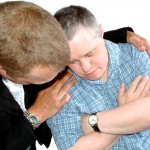
It is clearly important to pay close attention to the emotional needs of people with learning disabilities at a time of bereavement, but this can be especially difficult to do if the bereaved person has a limited understanding of the concept of death.
The researchers in this study wanted to understand how people with learning disabilities understand and explain death and how they make sense of life without the deceased. They interviewed 34 people with learning disabilities using vignettes describing death-related incidents. They asked those taking part questions about causes of death, the status of the body after death and whether all living things die. They also asked about reactions to death and got views about post-bereavement support.
They found that almost a quarter of those who took part had a full understanding of the concept of death and that over two thirds had a partial understanding. They found a positive correlation between death comprehension, cognitive ability and adaptive functioning. Most participants thought that death was predominantly associated with illness and old age, but they also saw death as final and understood that all living things die. Religious beliefs were also found to be important for many participants.
The authors conclude that their findings add to the evidence that people with learning disabilities have only a partial understanding of the concept of death and consequently they may have “factually incorrect thoughts”. They conclude that their findings highlight “scope for making sense of death using religious and spiritual themes and emphasise the need for teaching individuals biological explanations of the life cycle.”
Concept of death and perceptions of bereavement in adults with intellectual disabilities, McEvoy J et al., in Journal of Intellectual Disability Research, 56: 191–203
